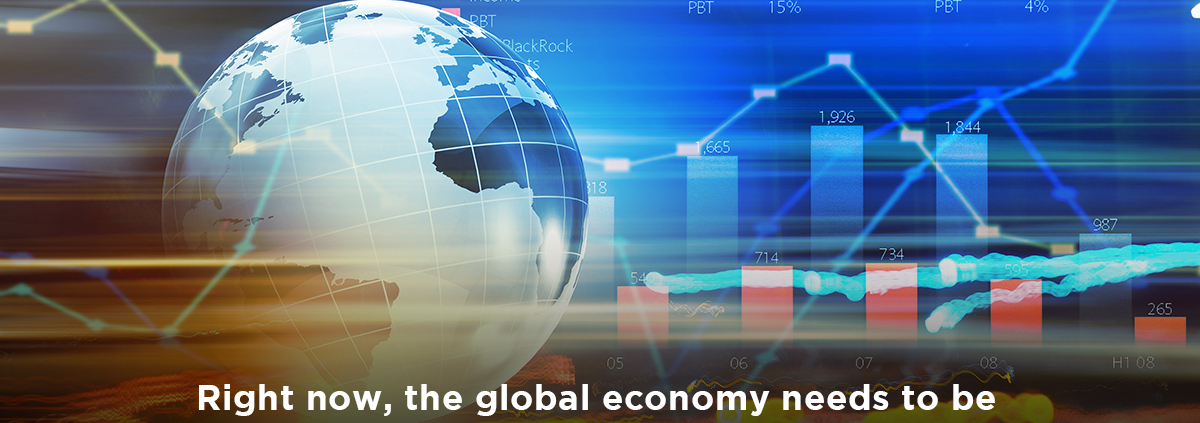Who would have ever thought that there would come a time when most of the whole was restricted in its movements and economic activity? I didn’t, but here we are. One of the major problems we are facing, as country after country goes into lockdown, is a global economic meltdown. Those of us who are able to work from home are thanking our lucky stars because as COVID-19 spreads, businesses around the world, especially small and medium enterprises, are taking a massive economic hit.
Estimates vary, with the likes of Bloomberg and Orlik conjecturing an output loss of $2.7 trillion, while the Asian Development Bank hypothesizes anything between a $77 to $347 billion downturn. Most vulnerable are the people in the low-income group and the middle-class who will feel the pinch most. Recently, more than 6 million people filed for unemployment in the US alone! How much more will emerging markets like India, with its migrant/daily worker issues, be affected? We will see a decline in wealth, inequality of income, salary cuts, and so on. The financial crunch, I’m afraid, will be felt from the bottom up.
Government intervention – but mostly for the bigwigs
Almost a century ago, the crash of 1929 sent the world’s economy into a tailspin. Today, while the coronavirus pandemic has come as a bleak reminder of our mortality, even bleaker are the headlines predicting a global economic catastrophe that could rival the Great Depression. Even in traditionally strong markets like the US, UK – both of whom have been exposed as poorly prepared to respond to the Covid-19 crisis – and mainland Europe, we can see how the virus is playing havoc. Companies around the world are being pushed to seek federal help and this prompts the question of whether it is capitalism or socialism, which is best equipped to handle such a crisis. How will our elected officials handle this situation? Will they be able to find a balance between these two concepts to stabilize the economy now, and in the aftermath of the virus?
The US, traditionally, has been very averse to socialism, but some of its recent decisions certainly seem socialist, only a version that is directed at the top end of town only. How else would one describe last year’s bail outs for the banks and General Motors? Yes, people benefited from that influx of money. Unfortunately, these beneficiaries were executives and CEOs, who walked away with millions in bonus packages, while none of the money percolated down to the salaried employees, many of whom were made redundant. So, here we see how the socialist ideal of “benefits for all” actually only benefited the “capitalists”, the “one per-centers”. The recent $2 trillion federal stimulus package in the US has a $17 billion bailout provision for Boeing. Why should taxpayers help out a company that has landed itself in trouble over the 737 Max fiasco, which occurred way before the pandemic?
Best of both worlds
What we are seeing now is a shift by governments around the world to a “mixed economy”, a blend of capitalism and socialism. Spain has nationalized its private hospitals, the UK is looking at nationalizing their transport systems, while France is ready to nationalize its large businesses. In India, on the other hand, the government has decided to launch a $29 billion privatization drive to help buttress a slow economy. On the block are the Life Insurance Corporation of India, Air India, and Bharat Petroleum.
We are also seeing a breakdown in labour markets. The UK and Denmark are giving people money, effectively a dole, to stop them from going into work. I see this as a shift from the fundamental truth that people should do an honest day’s work to earn an income, to one where people might begin to take for granted that they should be “paid” to live well, despite not working. That is a dangerous concept. What happens after the virus recedes? Will there be jobs for these workers to go back to? There is a certain dignity in earning one’s keep and governments need to ensure that the job market recovers.
I am not denying the fact that the important stakeholders of privatization need economic protection, but the ordinary citizen must benefit too. Most of Asia, Germany, and the Scandinavian countries, all seem to be finding a balance between socialism and capitalism during this crisis. The capitalists claim that the recipients of social welfare are the ones draining the system. I find that that pretty hypocritical considering the pay packages and other benefits like generous bonuses, the best health insurance, lifetime pensions, and huge retirement packages they receive. This is what really drains the economy more than social welfare.
Time to make changes
There is no doubt that global economy was floundering even before the arrival of this pandemic. I feel that COVID-19 has only highlighted the deficiencies in the system, and we are seeing people being forced out of jobs, which didn’t pay well enough anyway. What we need now is nothing short of a revolution, in social thought and mentality. We need to move away from using market profits as the sole primary driver of an organized economy. I feel this may help us build a system that is more humane and egalitarian that will make us more resilient should we, heaven forbid, ever face another global health crisis. For the immediate future, our economic survival will depend on how governments around the world come together and respond to this pandemic and its aftermath. Maybe what is needed is a spoonful of socialism to make capitalism more palatable.



